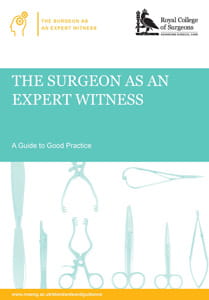The Surgeon as an Expert Witness

Brief description
Serving as an expert witness can be a fascinating and intellectually stimulating experience. However, expert witness testimony is faced with increased legal scrutiny in clinical negligence litigation. Ensuring quality and consistency of expert witnesses available to civil and criminal courts is in the interests of both the public and the medical profession. It is therefore fundamental that surgeons fully understand the environment in which their views are being sought, so they can navigate the process correctly and with integrity.
Who is this guide for?
This guide has been produced as an introduction to good practice for surgeons who already act as expert witnesses, as well as for those who are considering entering this field.
Professor Neil Mortensen, RCS Vice President, said: ‘With a continuing rise in the numbers of medico-legal claims, this new guidance is very relevant and timely. Patients, surgeons, lawyers and the courts rely on experts for independent, objective, balanced and contemporary advice. We hope this summary of good practice will help to improve the quality of expert evidence, in what can often be difficult and distressing circumstances for patients and surgeons.’
What can I learn from this guide?
The guidance provides practical advice on the nature and scope of the role and how this differs in civil and criminal proceedings. It addresses some of the main legal and ethical requirements for expert witnesses, and gives advice on how to assess evidence, how to avoid common errors and how to navigate the different positions of the court, jury, and solicitors.
Some of the practical advice the guidance offers includes:
- Understand the risk of acting as an expert witness outside your specialty
- Resist becoming adversarial in the face of opposing barristers
- Remain consistent in your written report and oral evidence
- Seek essential training before acting as an expert witness in a criminal case
- Beware of ‘expert shopping’ where a view favourable to one side is sought
 Download The Surgeon as an Expert Witness
Download The Surgeon as an Expert Witness
Further resources
Guidance
Royal College of Surgeons of England. Good Surgical Practice. RCS, 2014.
General Medical Council. Acting as a Witness in Legal Proceedings. GMC, 2013.
British Medical Association. Working as an expert witness. BMA, 2014.
General Medical Council. Independent Review of Gross Negligence Manslaughter and Culpable Homicide. GMC, 2018.
Academy of Medical Royal Colleges. Acting as an Expert of Professional Witness. AoMRC, 2019.
Legislation
England and Wales
Civil Evidence Act 1995: www.legislation.gov.uk/ukpga/1995/38/contents.
Civil Procedure Rules, Part 35 Experts and Assessors: www.justice.gov.uk/courts/procedurerules/civil/rules/part35.
Criminal Justice Act 2003: www.legislation.gov.uk/ukpga/2003/44/contents.
Criminal Procedure Rules, Part 19 Expert Evidence: www.justice.gov.uk/courts/procedurerules/criminal/docs/2015/crim-proc-rules-2015-part-19.pdf.
Scotland
The Criminal Procedure Rules and Court Rules: www.scotcourts.gov.uk/rules-and-practice/rulesof-court/criminal-procedure-rules.
Northern Ireland
Criminal Justice (Evidence) (Northern Ireland) Order 2004: www.legislation.gov.uk/nisi/2004/1501/contents.
